
Pic Courtesy - UnSplash
In the fast-paced environment of startups, “working hard” is frequently celebrated. Long hours, all-nighters, and an unending state of “busy-ness” are sometimes regarded as badges of honor. But what if there is a better way? What if, instead of working hard, you worked smartly?
This blog post looks at practical ways to improve your workflow, increase productivity, and accomplish more in less time. We’ll also look at a real-world case study to see these principles in work.
The Myth of “Hustle Porn”
The “hustle porn” culture frequently associates hard work with achievement. While dedication is vital, merely working longer hours does not ensure better results. In fact, it can frequently result in burnout, lower productivity, and a loss in overall well-being. Working intelligently, on the other hand, aims to maximize output by strategic preparation, prioritization, and focused execution. It is about working smarter, not harder.
Key Strategies for Working Smart:
1. Make a Plan:
A well-defined plan is the foundation of wise work. Without a map, you’re more likely to roam aimlessly, squandering time and energy. Your strategy should include both short- and long-term goals.
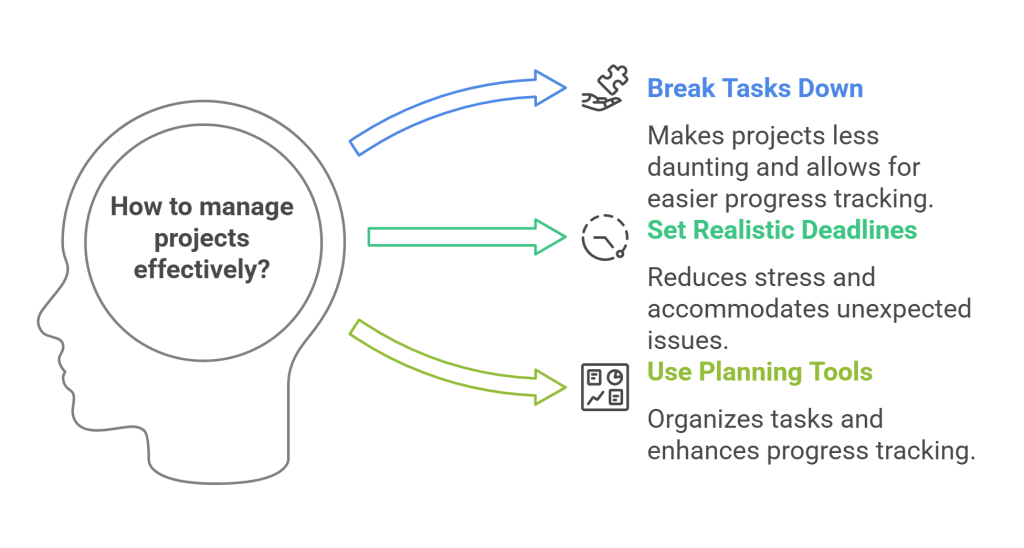
- Break it down: Large, overwhelming tasks should be broken down into smaller, manageable steps. This makes the overall project less daunting and allows you to track progress more easily.
- Set realistic deadlines: Avoid setting unrealistic deadlines that lead to stress and rushed work. Be honest about the time required for each task and build in some buffer time for unexpected issues.
- Use planning tools: Leverage tools like project management software (Asana, Trello, Monday.com), calendars, and to-do lists to organize your tasks and track your progress.
2. Cut Off From Social & Digital Media:
In today’s hyper-connected society, distractions are everywhere. Social networking, email notifications, and instant messaging can constantly disrupt your flow, reducing your capacity to concentrate.
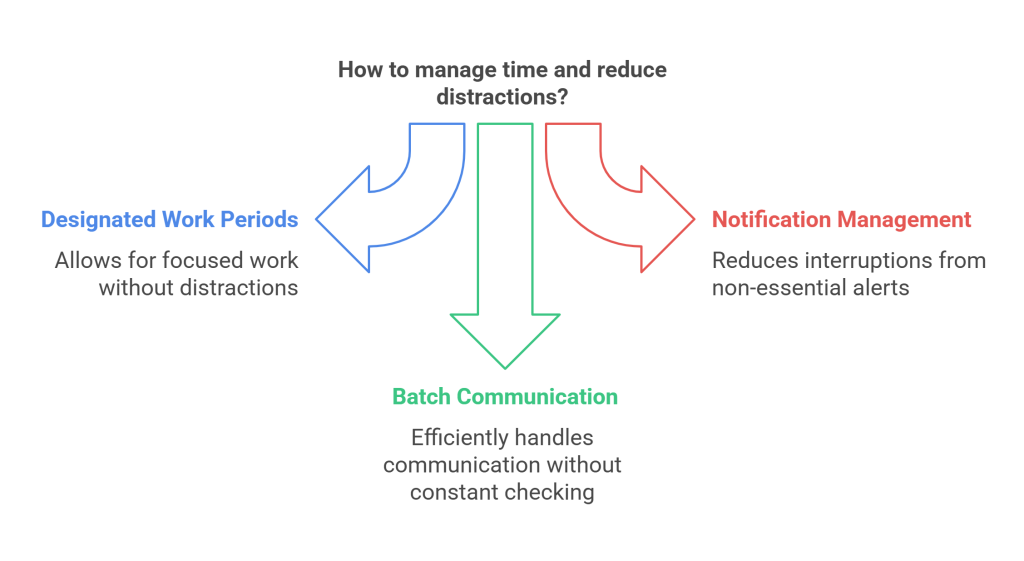
- Designated work periods: Set aside specific blocks of time for focused work, during which you completely disconnect from all distractions.
- Notification management: Turn off non-essential notifications on your phone and computer. Consider using website blockers to prevent yourself from getting sucked into social media rabbit holes.
- Batch communication: Instead of constantly checking email and messages, schedule specific times to address them in batches.
3. Prioritize The Work Properly:
Not all tasks are created equally. Some tasks have a more significant impact on your objectives than others. Effective prioritization is critical for maximizing productivity.

- Eisenhower Matrix (Urgent-Important): This tool helps you categorize tasks based on their urgency and importance. Focus on the “important but not urgent” tasks, as these are often the key to long-term success.
- Pareto Principle (80/20 Rule): This principle suggests that 80% of your results come from 20% of your efforts. Identify the 20% of activities that generate the most value and prioritize them accordingly.
- Timeboxing: Allocate specific time slots for different tasks based on their priority. This helps you stay focused and avoid getting bogged down in less important activities.
4. Organize Properly
Cluttered workspaces and unstructured files can dramatically reduce your productivity. Organizing your physical and digital environments can help you save time and mental energy.
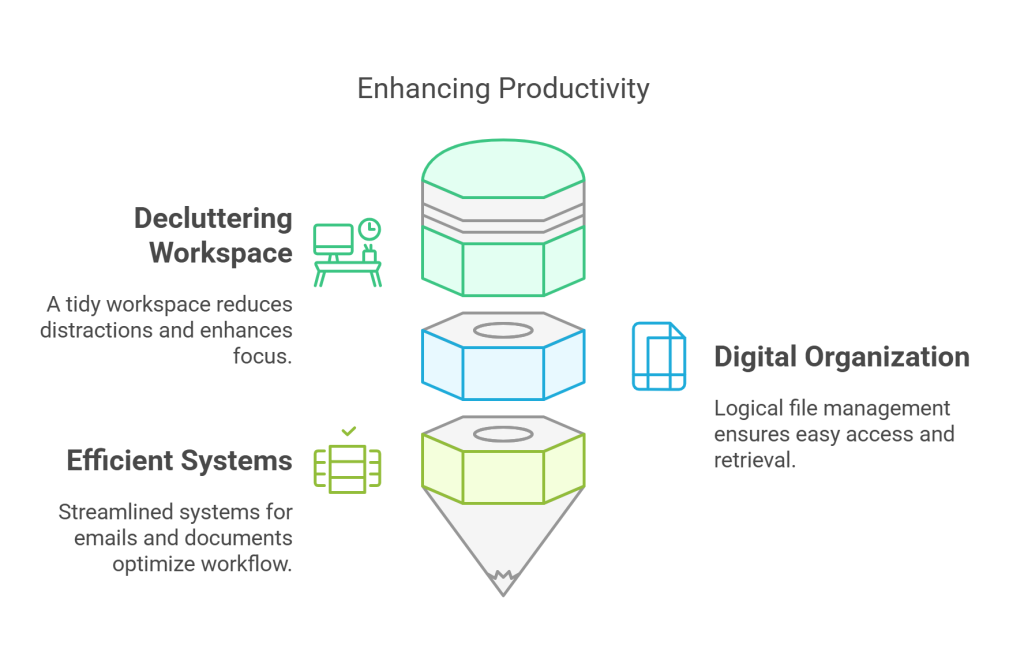
- Declutter your workspace: A clean and organized workspace promotes focus and reduces distractions.
- Digital organization: Organize your files and folders logically so you can easily find what you need. Use cloud storage solutions to ensure your files are accessible from anywhere.
- Efficient systems: Develop systems for managing your emails, documents, and other information to streamline your workflow.
5. Finish What You Start:
Starting many projects without completing them can result in feelings of overwhelm and a lack of accomplishment. Complete one assignment before moving on to the next.
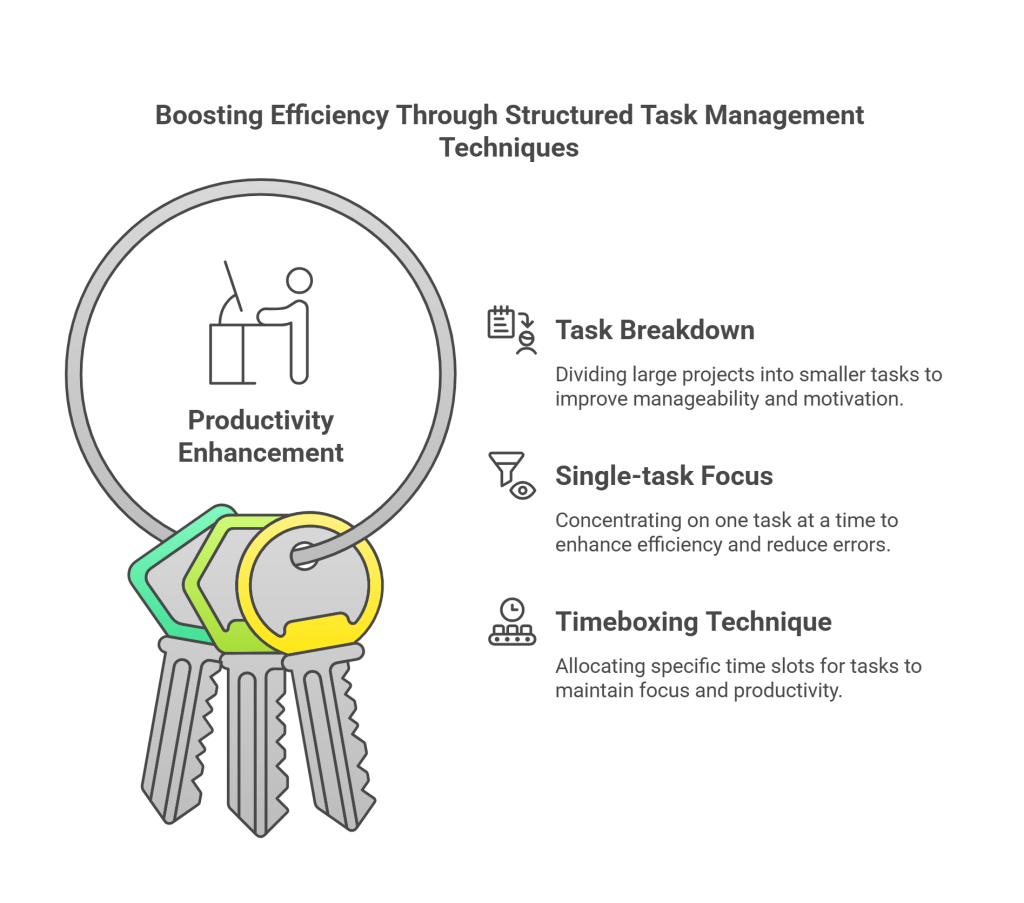
- Break down large projects: As mentioned earlier, break large projects into smaller, manageable steps. This makes it easier to track your progress and stay motivated.
- Avoid multitasking: While multitasking might seem efficient, research has shown that it actually reduces productivity and increases errors. Focus on one task at a time for optimal performance.
- Timeboxing: Allocate a specific time slot to work on a particular task and stick to it until the task is completed (or the allocated time is up).
6. Take Regular Breaks:
It may appear contradictory, but taking regular breaks is critical for maintaining focus and productivity. Working continually without taking breaks might lead to mental tiredness and decreased productivity.
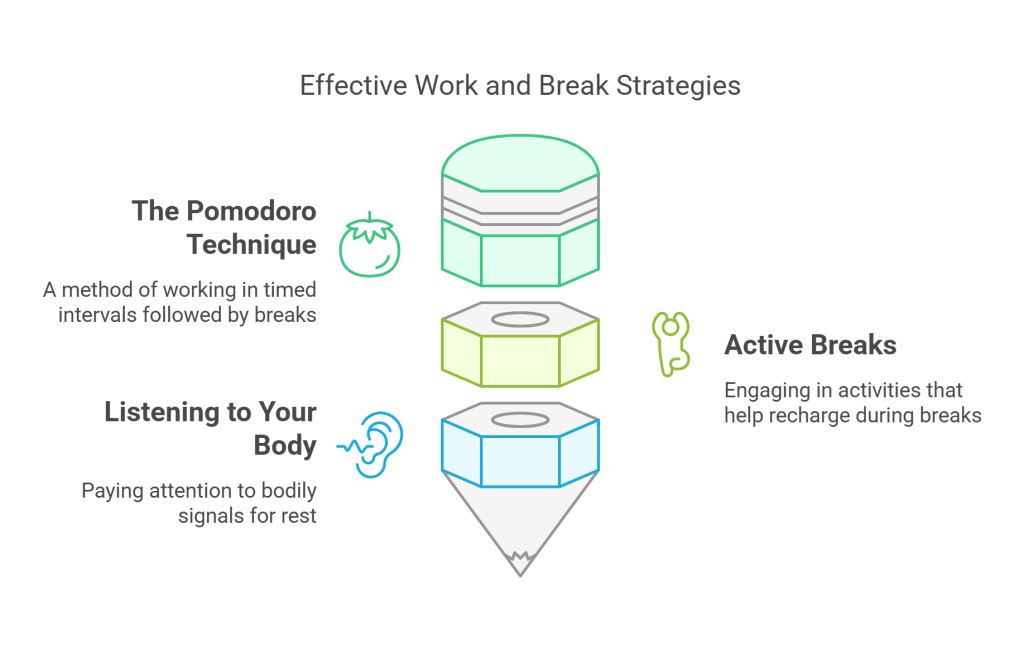
- The Pomodoro Technique: This technique involves working in focused bursts of 25 minutes, followed by a 5-minute break. After four cycles, take a longer break of 15-20 minutes.
- Active breaks: Instead of just scrolling through social media during your breaks, try to engage in activities that help you recharge, such as stretching, going for a walk, or listening to music.
- Listen to your body: Pay attention to your body’s signals and take breaks when you feel tired or overwhelmed.
7. Review Your Work:
Regularly analyzing your work allows you to identify areas for improvement and make sure you’re on pace to meet your objectives.
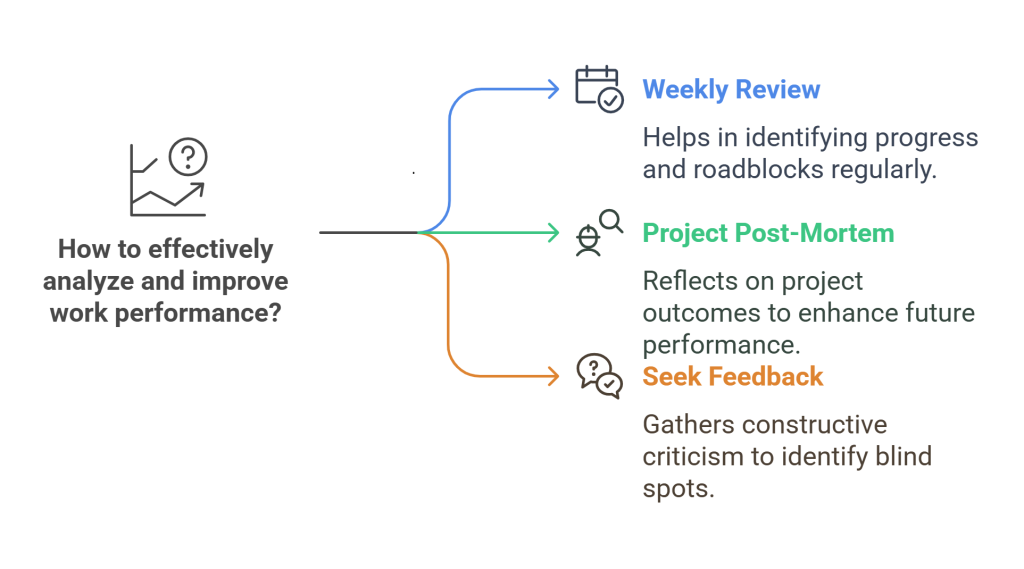
- Weekly review: Set aside some time each week to review your progress, identify any roadblocks, and adjusyour plan for the following week.
- Project post-mortem: After completing a project, take some time to reflect on what went well, what could have been done better, and what lessons you can apply to future projects.
- Seek feedback: Don’t be afraid to ask for feedback from colleagues, mentors, or clients. Constructive criticism can help you identify blind spots and improve your work.
Case Study: How Basecamp Worked Smart to Build a Project Management Empire
Basecamp, a major project management and team communication software provider, is an excellent example of a company that has prioritized working smart over working hard. Jason Fried founded Basecamp in 1999, and the company has continually promoted a concept of focused work, fair hours, and a good work-life balance. This approach has not only generated a great company culture, but has also contributed to their long-term success.
The Challenge: Overwork and Distraction
In the early days of Basecamp (formerly 37signals), the team, like many startups, struggled with long hours, constant distractions, and the pressure to meet the needs of a growing firm. They understood how this unsustainable pace was affecting their productivity, creativity, and overall well-being.
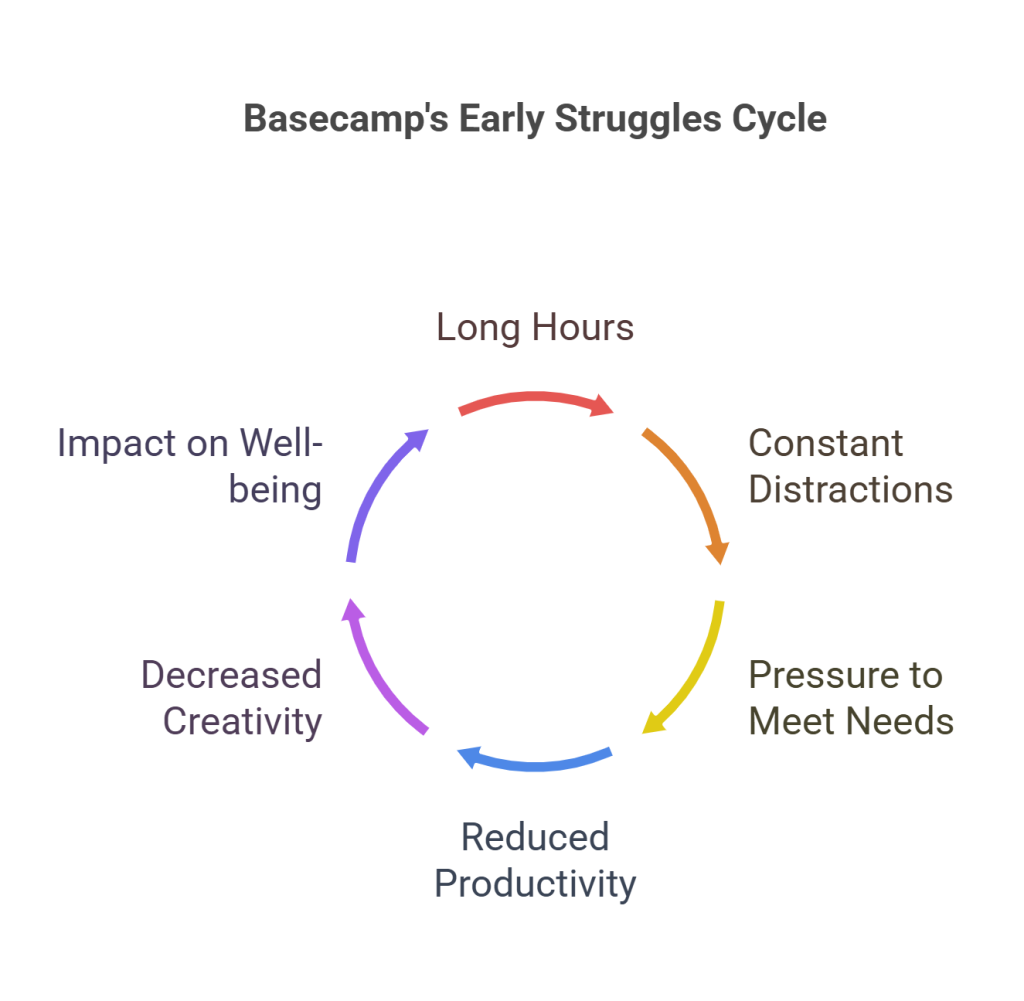
The Solution: Embracing Smart Work Principles
Basecamp consciously decided to shift their focus from “busyness” to “effectiveness.” They implemented several key strategies that align with the principles of working smart:
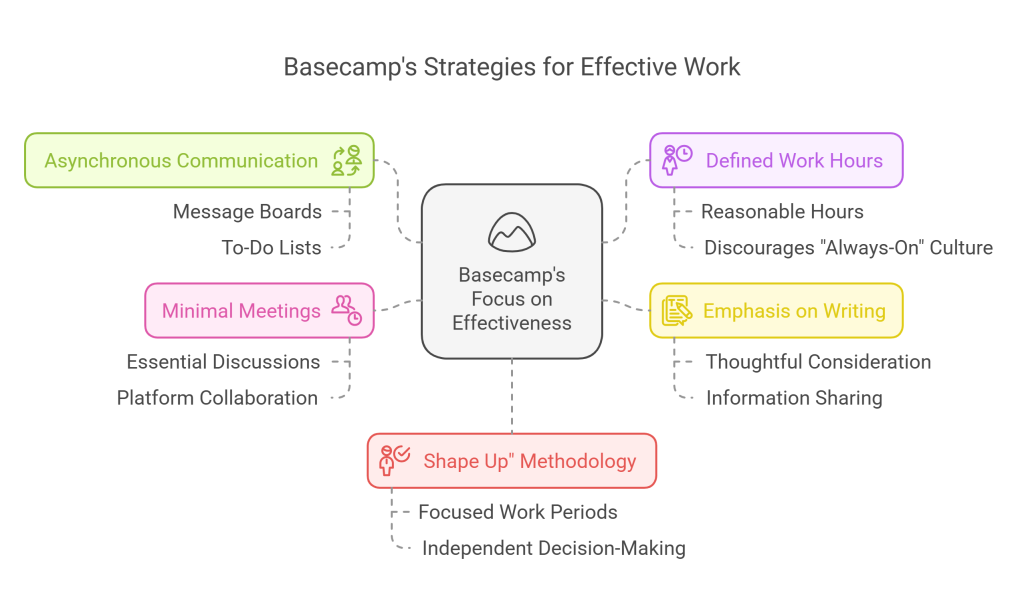
- Asynchronous Communication: Basecamp heavily relies on asynchronous communication, meaning team members don’t need to be constantly “present” or available for immediate responses. This reduces the pressure of constant interruptions and allows individuals to focus on their tasks without distractions. They use tools like message boards, to-do lists, and document sharing to keep everyone informed and aligned.
- Defined Work Hours: Basecamp has consistently advocated for reasonable work hours and discourages “always-on” culture. They believe that employees are more productive and creative when they have adequate time to rest, recharge, and pursue personal interests. This focus on work-life balance has become a hallmark of their company culture.
- Emphasis on Writing: Basecamp emphasizes clear and concise written communication. This approach promotes thoughtful consideration and reduces misunderstandings that can arise from quick, informal exchanges. Writing also allows information to be easily shared and referenced later, further boosting efficiency.
- Minimal Meetings: Basecamp minimizes the need for meetings, recognizing that they can often be unproductive and time-consuming. They encourage teams to handle communication and collaboration through their platform, reserving meetings only for essential discussions.
- “Shape Up” Methodology: Basecamp has developed its own product development methodology called “Shape Up,” which emphasizes focused work periods and independent decision-making. This approach allows teams to work autonomously on projects for several weeks without constant interruptions or micromanagement.
The Results: Productivity and Well-being
Basecamp’s commitment to working smart has yielded impressive results:
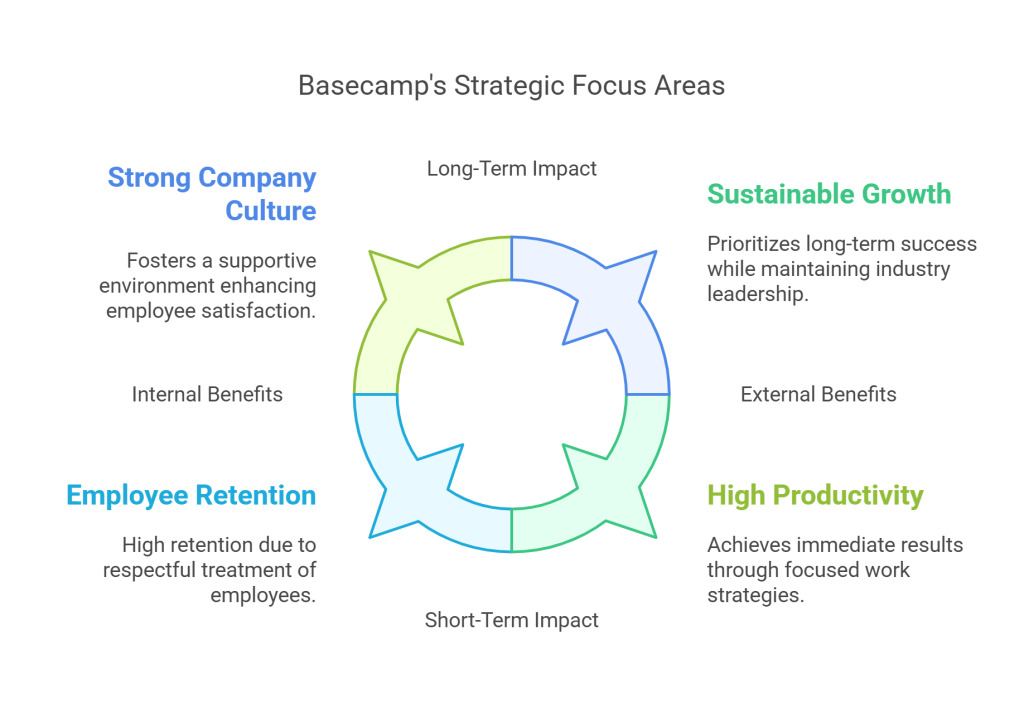
- High Productivity: By focusing on deep work, minimizing distractions, and streamlining communication, Basecamp employees are able to achieve more in less time.
- Strong Company Culture: Basecamp’s emphasis on work-life balance and respect for individual time has fostered a positive and supportive company culture.
- Employee Retention: Basecamp has a reputation for treating its employees well, which contributes to high employee retention rates.
- Sustainable Growth: By prioritizing long-term well-being and avoiding burnout, Basecamp has been able to achieve sustainable growth and maintain its position as a leader in the project management software industry.
Key Takeaways from Basecamp’s Success:
- Challenge the “always-on” mentality: Just because technology makes it possible to be constantly connected doesn’t mean you should be.
- Prioritize deep work: Create an environment where employees can focus on their tasks without distractions.
- Embrace asynchronous communication: Reduce the need for constant meetings and interruptions.
- Value work-life balance: Encourage employees to disconnect and recharge.
- Invest in clear communication: Promote thoughtful written communication to minimize misunderstandings.
Basecamp’s success story proves that working smart is more than just a lovely idea; it’s a viable and practical approach to start a successful business. Basecamp has established a long-term model for productivity and success in the fast-paced world of technology by emphasizing focus, efficiency, and employee well-being.
Working smart does not require shortcuts or hacks. It’s about taking a strategic approach to work, prioritizing high-impact activities, and streamlining your workflow for optimal efficiency. Implementing the ideas suggested in this blog article can help you increase productivity, meet your goals, and create a more sustainable and happy work environment. You, too, can accomplish exceptional outcomes by adopting smart work concepts, just like GreenGrocer has. Remember that what you do in those hours is more important than how many hours you work. Work smarter, not harder, and watch your startup grow.




More Blogs
Navigating Startup Failures !
Managing cash flow for startups
Startup & Maintaining Morale: Navigating the Rollercoaster of Growth